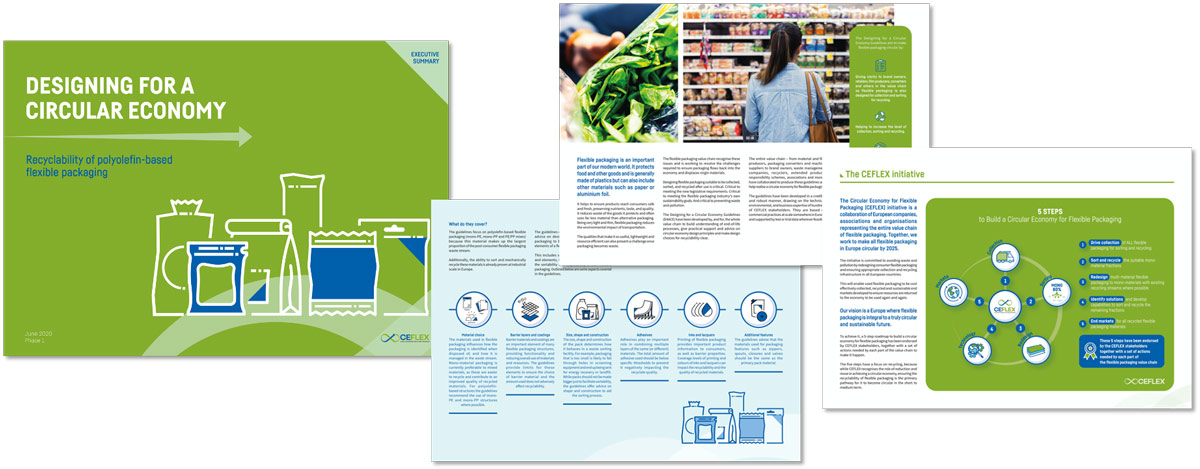CEFLEX is pleased to announce a major collaboration with UK Research and Innovation (UKRI) to co-fund investigations into how flexible packaging can be best designed to be sorted and recycled.
An extensive testing programme will draw on a network of leading laboratories, universities and industry experts to generate robust, independent and credible data to update and improve the ‘Designing for a Circular Economy’ guidelines originally issued in 2020.
Results will extend understanding of specific design elements and their impact on sorting and recyclability. Together with increasing levels of collection, sorting and recycling of flexible packaging, they will further improve the quantity and quality of recycled materials. Essential elements to help to deliver on UK Plastics Pact targets and develop a circular economy for flexible packaging across Europe.
“By strengthening our efforts through collaboration with UKRI and increasing understanding of exactly how different materials and elements in a flexible packaging structure affect sortability and recyclability, we can address essential gaps in knowledge and apply this in practice,” said Graham Houlder, CEFLEX Project Coordinator.
Cutting-edge insights to boost innovation and sustainability
“Films and flexibles are the final frontier in the drive towards more sustainable plastic packaging, and higher recycling rates will be essential if we are to achieve the UK Plastics Pact’s 2025 targets. I am delighted that SSPP Challenge funding will support and accelerate the testing and trials needed to provide the underpinning evidence base for CEFLEX’s Designing for a Circular Economy guidelines.”
The UK Research and Innovation Smart Sustainable Plastic Packaging challenge (SSPP) aims to make plastic packaging fit for a sustainable future and identified advancing CEFLEX design guidelines as an important element in addressing key barriers to change.
SSPP Challenge Director Paul Davidson said: “Films and flexibles are the final frontier in the drive towards more sustainable plastic packaging, and higher recycling rates will be essential if we are to achieve the UK Plastics Pact’s 2025 targets. I am delighted that SSPP Challenge funding will support and accelerate the testing and trials needed to provide the underpinning evidence base for CEFLEX’s Designing for a Circular Economy guidelines.”
The extensive testing programme will be co-funded by the challenge, with up to £500,000 being made available by UKRI; matched by CEFLEX stakeholder contributions. This will enable a more comprehensive assessment and generate much-needed data to update the ‘Designing for a Circular Economy’ guidelines.
“The phase 2 testing programme is a catalyst for pushing state of the art understanding forward. To improve design choices by understanding how flexible packaging moves throughout end-of-life processes and generates value in a circular economy”
“During development of the initial Designing for a Circular Economy (D4ACE) guidelines, a number of knowledge gaps were identified that need to be filled and supported by robust testing and data. The phase 2 testing programme is a catalyst for pushing state of the art understanding forward. To improve design choices by understanding how flexible packaging moves throughout end-of-life processes and generates value in a circular economy” explains CEFLEX design lead, Liz Morrish.
Specific areas of investigation include:
- Near Infra-red (NIR) classification testing with HTP Cyclos and the Dutch National Test Centre for Circular Plastics (NTCP)
- Sortability testing including Eddy Current Separation and ballistic separation processes
- Mechanical recyclability testing on a range of materials and elements such as inks, adhesives and barrier materials used in flexible packaging structures
- Recyclability testing will be conducted by a group of established laboratories across Europe, including Aimplas, HTP Cyclos, Impact Solutions and Proplast with a focus on PE and PP waste streams.
Targeting knowledge gaps and shaping tomorrow’s design and infrastructure
To help prepare the programme a peer review of existing data by Queens University Belfast, University of Maastricht and University of Gent has been undertaken. This will ensure the testing programme is targeted and effective at building on current understanding and data.
Testing will also be done to better understand if and how the flexible packaging structures that are not currently widely sorted and mechanically recycled in existing polyethylene, polypropylene and mixed-polyolefin waste streams, can be technically sorted and recycled.

More information about the Smart Sustainable Plastic Packaging (SSPP)
The Smart Sustainable Plastic Packaging (SSPP) challenge aims to establish the UK as a leading innovator in smart and sustainable plastic packaging for consumer products with £60 million in funding which will be complemented by £149 million from industry. The challenge will deliver cleaner growth across the supply chain, with a dramatic reduction in plastic waste entering the environment by 2025. Part of this funding will develop and demonstrate at scale new business models for reuse and refill as a well as behavioural change. Delivered by UK Research and Innovation (UKRI), more detail on the SSPP Challenge can be found online.
Follow our #MissionCircular progress
